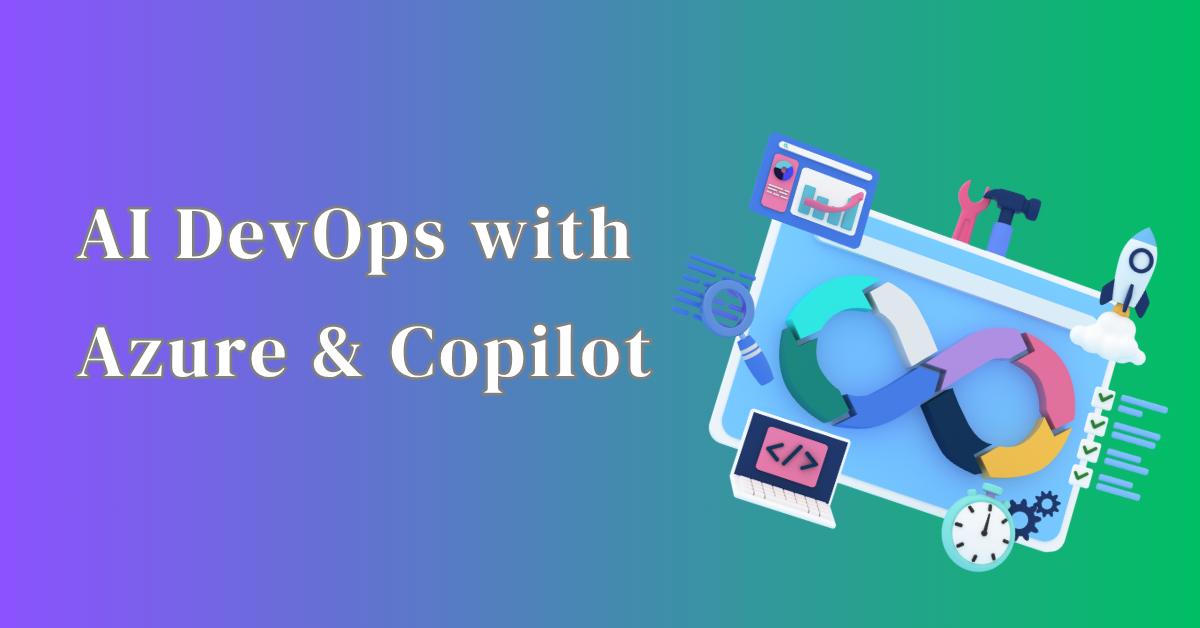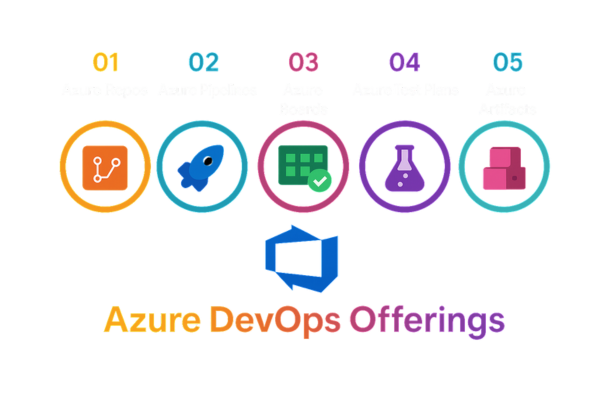AI-Powered DevOps: Deliver Faster with Azure and GitHub Copilot
Supercharge Your DevOps with AI

As enterprises modernize software delivery, the convergence of AI-driven development and automated DevOps pipelines is becoming the new standard. Organizations are under increasing pressure to release features faster, reduce bugs, and streamline collaboration across distributed teams. With the integration of Azure DevOps and GitHub Copilot, teams can now deliver software faster, more securely, and more confidently.
This article explores how combining Azure DevOps services with GitHub Copilot can help engineering teams achieve rapid time-to-market through AI-enhanced workflows, automation, and intelligent coding assistance.
Why AI in DevOps Matters
Software development has reached an inflection point. While effective, Traditional DevOps automation still requires extensive human input, particularly during coding, debugging, and testing. AI-enhanced DevOps addresses these bottlenecks by introducing intelligent code generation, automated testing, and smarter CI/CD decision-making.
The result is a more efficient, scalable DevOps ecosystem, with reduced cognitive load on developers and faster iteration cycles. In 2025, businesses embracing AI in DevOps will lead in delivery velocity, product quality, and developer experience
Overview of Azure DevOps and GitHub Copilot
Azure DevOps
Microsoft’s Azure DevOps provides a comprehensive, all-in-one platform that streamlines every phase of the software development lifecycle from planning and coding to building, testing, releasing, and monitoring. It includes:
- Azure Repos – Git-based version control
- Azure Pipelines – CI/CD automation
- Azure Boards – Agile project tracking
- Azure Test Plans – Manual and automated testing
- Azure Artifacts – Package management
The platform is designed to scale from small teams to enterprise-grade delivery systems, supporting integrations across the Microsoft ecosystem and third-party tools.
Learn more from the official Azure DevOps documentation.

GitHub Copilot
GitHub Copilot, powered by OpenAI Codex, is an AI-powered code assistant that integrates with Visual Studio Code, Visual Studio, JetBrains, and other IDEs. It suggests code snippets, entire functions, and even documentation in real-time, helping developers focus on business logic rather than boilerplate.
With GitHub Copilot, developers can:
- Autocomplete lines or blocks of code
- Generate unit tests
- Improve consistency across codebases.
See GitHub Copilot for detailed usage and supported IDEs.
Integrating GitHub Copilot into the Azure DevOps Workflow
The combination of GitHub Copilot and Azure DevOps creates an AI-augmented CI/CD workflow. Here's how the integration flows across the development lifecycle:
1. Planning & Backlog Management
Use Azure Boards to manage epics, user stories, and sprints. Work items are linked to code changes for full traceability.
Toolset: Azure Boards, GitHub Issues
2. Code Development with GitHub Copilot
GitHub Copilot suggests context-aware code in the development phase, reducing manual effort.
Example: Python API Endpoint with Copilot
@app.route('/api/orders', methods=['GET'])
def get_orders():
orders = Order.query.all()
return jsonify([order.serialize() for order in orders])
Copilot accelerates backend development by auto-generating function scaffolding from names and docstrings.
Toolset: GitHub Copilot + VS Code
3. Version Control with Azure Repos or GitHub
Whether using Azure Repos or GitHub, developers push code, trigger pull requests, and begin integration testing.
Toolset: Azure Repos, GitHub Pull Requests
4. Continuous Integration with Azure Pipelines
CI is triggered automatically upon code commit. Azure Pipelines run builds, unit tests, static code analysis, and security scans.
Example Azure Pipeline for Python App:
trigger:
- main
pool:
vmImage: 'ubuntu-latest'
steps:
- task: UsePythonVersion@0
inputs:
versionSpec: '3.x'
- script: |
pip install -r requirements.txt
pytest
displayName: 'Run unit tests'
Toolset: Azure Pipelines, YAML configuration
5. Continuous Delivery to Azure Services
Successful builds are deployed to Azure App Services, Kubernetes (AKS), or container registries. Pipelines support approvals, gates, and rollback.
Toolset: Azure Pipelines, Azure App Service, Azure Kubernetes Service
6. Monitoring and Feedback
Azure Monitor and Application Insights offer real-time performance telemetry and usage analytics post-deployment. These insights feed back into the development cycle.
Toolset: Azure Monitor, Application Insights
Benefits of Azure DevOps + GitHub Copilot Integration
| Feature | Impact |
|---|---|
| Accelerated Coding | Reduce boilerplate work and development time |
| Higher Code Quality | AI-generated suggestions align with coding best practices |
| Streamlined CI/CD | Fully automated pipelines from commit to deploy |
| Fewer Bugs in Prod | Copilot-generated test cases and automated QA |
| Improved Developer Experience | Less context-switching and faster onboarding for new devs |
Adopting this AI-powered toolset allows organizations to achieve velocity without compromising quality, a crucial competitive edge in 2025
AI-Augmented DevOps Lifecycle

Real-World Use Cases
E-Commerce
- Deploying new product features rapidly using Copilot-assisted coding
- Rollout via Azure Pipelines to global AKS clusters
Banking
- Generating secure, standards-compliant code
- Copilot-powered automated testing integrated with Azure DevOps gated approvals.
Healthcare
- Copilot helps in generating complex validation logic for sensitive data
- Azure ensures HIPAA-compliant deployments.
Why Choose Azure for DevOps in 2025?
Azure is uniquely positioned as a DevOps-centric cloud platform. With tight integration across code, build, test, deploy, and monitor stages—combined with enterprise-grade security and scalability—Azure provides an ideal foundation for modern software delivery.
Additionally, using GitHub Copilot (developed by Microsoft) alongside Azure ensures maximum compatibility, licensing simplicity, and seamless integration across the ecosystem.
Get Started with AI-Powered DevOps Today
Enterprises that adopt AI-powered DevOps workflows are gaining a distinct advantage in speed and agility. With GitHub Copilot boosting developer productivity and Azure DevOps ensuring secure, automated delivery, businesses can confidently accelerate their digital transformation.

Conclusion
In 2025, software teams will no longer ask whether AI belongs in DevOps—they'll ask how to implement it effectively. Azure DevOps and GitHub Copilot integration delivers real value: faster releases, fewer bugs, and happier developers. Adopting this shift now positions organizations for lasting agility and growth.
FAQ'S
1. What is AI-powered DevOps and how does it benefit enterprises?
Answer:
AI-powered DevOps integrates artificial intelligence and machine learning into the software development lifecycle to automate tasks, optimize workflows, and enhance decision-making. For enterprises, this means faster releases, improved code quality, and reduced downtime—ultimately leading to increased agility and innovation.
2. How does GitHub Copilot enhance developer productivity?
Answer:
GitHub Copilot uses AI to suggest code snippets, entire functions, and even documentation in real time as developers write code. It minimizes repetitive work, accelerates development, and enables engineers to concentrate on solving complex problems instead of writing routine code.
3. What is Azure DevOps and how does it support automation and security?
Answer:
Azure DevOps is a suite of development tools by Microsoft that supports the entire DevOps lifecycle—planning, development, testing, delivery, and monitoring. It enables secure CI/CD pipelines, integrated testing, and infrastructure-as-code, helping teams deliver high-quality software faster and with fewer risks.
4. Can AI help reduce software development cycle times?
Answer:
Yes, AI tools like GitHub Copilot and intelligent CI/CD pipelines in Azure DevOps significantly reduce cycle times by automating routine tasks, identifying bugs early, predicting deployment failures, and accelerating testing and releases.
5. Is it difficult to integrate AI into existing DevOps workflows?
Answer:
Not necessarily. Platforms like GitHub Copilot and Azure DevOps are designed to be integrated with minimal disruption. Most enterprises start by introducing AI into specific tasks—like code completion or test automation—before scaling across the pipeline, ensuring a smooth and manageable transition.

